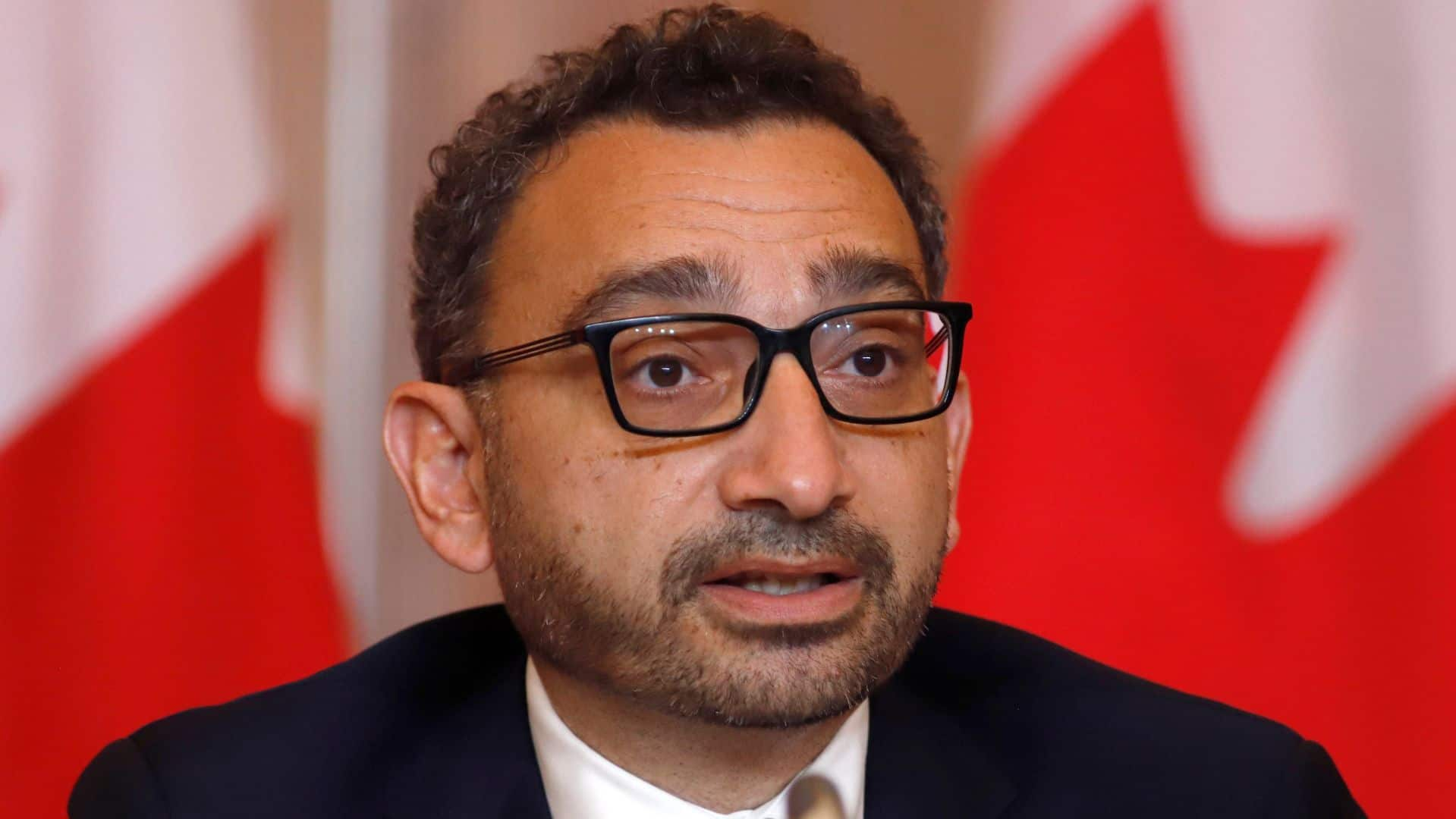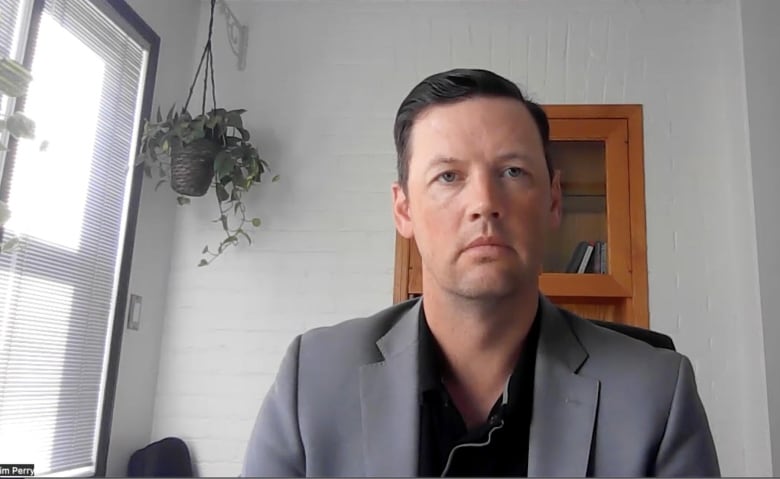
Fátima Sherefa, 17, had a rough night at Toronto’s Pearson Airport on August 6.
His flight home from Toronto to Winnipeg had been delayed several times and then, just after midnight, canceled.
Sherefa says Air Canada staff did not provide hotel accommodations for the night and instead handed out yoga mats to stranded travelers.
Sherefa says she slept on one of the mats on the floor of a women’s infirmary at the airport that night.
“It was very frightening, but also a new experience that I don’t think anyone should have to go through,” she said.
Sherefa is just one of thousands of air passengers caught up in the travel chaos that has hit Canada’s major airports this summer. As COVID-19 restrictions were lifted in the spring, a sudden surge in travel led to massive delays and cancellations and airport congestion.
Fatima Sherafa of Winnipeg holds the small yoga mat Pearson was given to sleep on. (Kevin Nepitabo/CBC)
On Friday, Transport Minister Omar Alghabra told the House of Commons transport committee that COVID-19 and labor shortages in the aviation industry are to blame and that, with the ‘help from the government, the travel chaos is dissipating.
“We are seeing significant improvements in the last two months,” he said.
But the chaos is far from over. Toronto’s Pearson Airport, which had the most flight delays in the world for most of the summer, has only moved into second place, according to flight tracking service FlightAware. And since May, more than 7,000 disgruntled travelers have flooded the Canadian Transportation Agency (CTA) with complaints related to flight disruptions.
The current problems have raised questions about whether the government is doing enough to fix the problem and whether it should have done more before the chaos began.
“The federal government needs to think about why this happened?” said Walid Hejazi, associate professor of economic analysis and policy at the University of Toronto’s Rotman School of Management.
“We are one of the richest countries in the world. It is completely unnecessary.”
LOOK | The Minister of Transport wondered about the chaos at the airport:
Federal Transport Minister grilled over summer of airport chaos
Federal Transport Minister Omar Alghabra was questioned by members of a parliamentary committee today about why the government hasn’t done more to ease the months of airport chaos Canadian travelers have faced.
What went wrong?
As with many countries, Canada’s travel woes began when demand spiked in the spring and many previously laid off aviation workers did not return, leading to staff shortages.
But Canada gained international attention this summer by topping the charts for flight delays. According to FlightAware, from May to July, Pearson had the highest delay rate among the world’s 100 busiest airports, with Montreal’s Trudeau Airport coming in second.
During this period, 53% of flights departing from Pearson and 46% from Trudeau were more than 15 minutes late at their destination.
Alghabra said Canada’s airports and airlines faced a more pronounced challenge compared to other countries, because the travel industry here virtually ground to a halt during the pandemic.
“The hole they’re climbing out of was deeper,” he said.
Alghabra says Ottawa quickly addressed the issue.
“We took action from the beginning and we will continue to do so.”
 Tim Perry, a WestJet pilot and president of the Airline Pilots Association’s Canadian arm, says the government should have addressed the root problems sooner. (CBC)
Tim Perry, a WestJet pilot and president of the Airline Pilots Association’s Canadian arm, says the government should have addressed the root problems sooner. (CBC)
But Tim Perry, a WestJet pilot and president of the Canadian Airline Pilots Association, argues the government was slow to act.
Perry says he warned the transportation committee in January 2021, more than a year before the increase in travel, that Ottawa, airports and airlines needed to come up with a plan.
“There was no comprehensive plan to coordinate or restart aviation,” he said. “A lot of what we see today was predicted back then. And I don’t like to say ‘I told you so,’ but I told you so.”
it’s better
Alghabra also said Friday that with the government’s help, the situation at Canada’s airports is improving. He said measures such as hiring 1,700 screening officers and moving random testing off-site have helped ease congestion.
The latest data from FlightAware also shows that the situation is improving, a little. Between August 10 and August 17, 44.1 percent of flights out of Pearson were delayed, dropping it to No. 2. London’s Gatwick Airport leads this time with a 45% of flights delayed.
Montreal Airport ranked seventh with 39.3% of delayed flights.
 Under federal rules, airlines must only pay compensation (up to $1,000) if a flight delay or cancellation is within an airline’s control and is not necessary for safety reasons. (Aaron Vincent Elkaim/The Canadian Press)
Under federal rules, airlines must only pay compensation (up to $1,000) if a flight delay or cancellation is within an airline’s control and is not necessary for safety reasons. (Aaron Vincent Elkaim/The Canadian Press)
However, the union representing 15,000 airline baggage handlers, screening officers and mechanics says labor shortages remain a problem.
Dave Flowers, president of District 140 of the International Association of Mechanics and Aerospace Workers, says several Canadian airlines or their outside contractors are trying to hire thousands of ground workers at the country’s major airports.
But Flowers says the jobs are hard to fill because wages, which range from $16.60 to $21 an hour, aren’t competitive enough in a tight labor market.
“I can go to Amazon today and they’ll hire me off the street today with benefits from day one and $21 an hour,” he said. “Or you can work in -30C on the ramp, or plus 40C on the ramp, loading luggage for the same money.”
Flowers warns that if the positions aren’t filled soon, travelers should prepare for more chaos.
“If they don’t fix the problem before the peak Christmas period … you’re going to see this problem come back again.”
Consumer complaints
Alghabra was questioned on Friday about what the government is doing to address the many complaints from passengers that they are being unfairly denied compensation by their airline.
According to federal regulations, airlines must only pay compensation (up to $1,000) if the flight delay or cancellation is within an airline’s control and is not necessary for safety reasons. Carriers must also cover accommodation costs for flight disruptions under their control.
Alghabra said the CTA is responsible for resolving passenger complaints and the government has given the transportation regulator an additional $11 million to deal with the recent flood of complaints.
This cash injection was first announced in the April 2022 federal budget.
Alghabra also said it is “unacceptable to see travelers sleeping on airport floors” due to delays or cancellations.
However, he did not announce any government action to prevent it from happening again.
Meanwhile, Sherefa, the passenger, said she hopes the government has a plan.
“Why does he do it [anyone] Do I have to sleep overnight in an airport just because a multi-billion dollar company can’t provide a hotel?” he said.

